Affective severity - Study guides, Class notes & Summaries
Looking for the best study guides, study notes and summaries about Affective severity? On this page you'll find 686 study documents about Affective severity.
Page 2 out of 686 results
Sort by
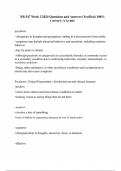
-
NR 547 WEEK 3 2024 QUESTIONS AND ANSWERS (VERIFIED) 100% CORRECT | A+ GRADE
- Exam (elaborations) • 26 pages • 2024
-
Available in package deal
-
- $13.00
- + learn more
psychosis - disruptions in thoughts and perceptions leading to a disconnection from reality -symptoms may include abnormal behaviors and sensations, including catatonic behavior -may be acute or chronic -Although psychosis is categorized as a psychiatric disorder, it commonly occurs as a secondary condition due to underlying endocrine, vascular, immunologic, or metabolic problems -Drugs, other substances, or other psychiatric conditions such as depression or mania may also cause symptoms P...
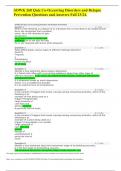
-
SOWK 260 Quiz Co-Occurring Disorders and Relapse Prevention Questions and Answers Fall 23/24.
- Exam (elaborations) • 14 pages • 2023
-
- $13.99
- + learn more
SOWK 260 Quiz Co-Occurring Disorders and Relapse Prevention Questions and Answers Fall 23/24. Which of the following is a feature of an individual who is most likely to be relapse-prone? He or she recognizes that a problem exists. He or she detaches to gain perspective. He or she evades or denies new problems. He or she asks for help. He or she responds with action when prepared. What differentiates various types of affective (feeling) disorders? Severity Frequency Precipitatin...
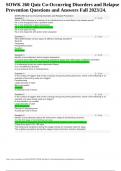
-
SOWK 260 Quiz Co-Occurring Disorders and Relapse Prevention Questions and Answers Fall 2023/24.
- Exam (elaborations) • 9 pages • 2023
- Available in package deal
-
- $11.99
- + learn more
SOWK 260 Quiz Co-Occurring Disorders and Relapse Prevention Questions and Answers Fall 2023/24. Which of the following is a feature of an individual who is most likely to be relapse-prone? He or she recognizes that a problem exists. He or she detaches to gain perspective. He or she evades or denies new problems. He or she asks for help. He or she responds with action when prepared. What differentiates various types of affective (feeling) disorders? Severity Frequency Precipitating fact...
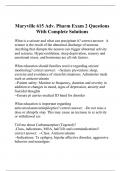
-
Maryville 615 Adv. Pharm Exam 2 Questions With Complete Solutions
- Exam (elaborations) • 18 pages • 2023
-
Available in package deal
-
- $13.99
- + learn more
What is a seizure and what can precipitate it? correct answer: A seizure is the result of the abnormal discharge of neurons. Anything that disrupts the neuron can trigger abnormal activity and seizures. Hyperventilation, sleep deprivation, sensory and emotional stress, and hormones are all risk factors. What education should families receive regarding seizure monitoring? correct answer: --Seizure prevention: sleep, exercise and avoidance of stressful situations. Administer meds such as anti...
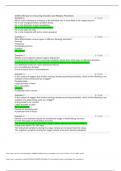
-
SOWK 260 Quiz Co-Occurring Disorders and Relapse Prevention with 100% Correct Answers 2023
- Exam (elaborations) • 9 pages • 2023
-
- $9.49
- + learn more
Question 2 2 / 2 pts What differentiates various types of affective (feeling) disorders? Severity Frequency Precipitating factors Duration All of these Question 3 2 / 2 pts Identify a true statement about organic depression. It is found more often with co-occurring substance abuse than other types of affective disorders. It can occur as a result of head injuries, nutritional deficiencies, and physical illness. It is otherwise known as manic-depressive illness. It is a nonaffective di...
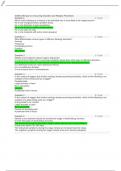
-
SOWK 260 Quiz Co-Occurring Disorders and Relapse Prevention
- Exam (elaborations) • 9 pages • 2024
-
- $8.00
- + learn more
SOWK 260 Quiz Co-Occurring Disorders and Relapse Prevention Question 1 2 / 2 pts Which of the following is a feature of an individual who is most likely to be relapse-prone? He or she recognizes that a problem exists. He or she detaches to gain perspective. He or she evades or denies new problems. He or she asks for help. He or she responds with action when prepared. Question 2 2 / 2 pts What differentiates various types of affective (feeling) disorders? Severity Frequency Precipitat...
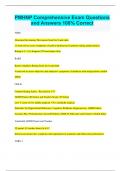
-
PMHNP Comprehensive Exam Questions and Answers 100% Correct
- Exam (elaborations) • 197 pages • 2023
- Available in package deal
-
- $12.99
- + learn more
PMHNP Comprehensive Exam Questions and Answers 100% Correct AIMS Abnormal Involuntary Movement Scale for 8 and older 12 item tool to assess symptoms of tardive dyskinesia for patients taking antipsychotics Rating 0-4, >2 to diagnose TD and reduce dose BARS Barnes Akathisia Rating Scale for 8 and older 4 item tool to assess objective and subjective symptoms of akathisia with antipsychotics and/or SSRIs CRS-R Connors Rating Scales - Revised for 3-17 ADHD Parent (80 items) and Teacher Scales ...
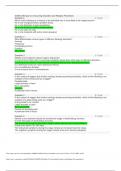
-
SOWK 260 Quiz Co-Occurring Disorders and Relapse Prevention
- Exam (elaborations) • 9 pages • 2023
- Available in package deal
-
- $10.49
- + learn more
SOWK 260 Quiz Co-Occurring Disorders and Relapse Prevention Question 1 2 / 2 pts Which of the following is a feature of an individual who is most likely to be relapse-prone? He or she recognizes that a problem exists. He or she detaches to gain perspective. He or she evades or denies new problems. He or she asks for help. He or she responds with action when prepared. Question 2 2 / 2 pts What differentiates various types of affective (feeling) disorders? Severity Frequency Precipitat...
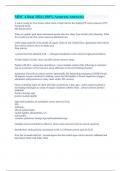
-
MDC 4 final 2024 (100% Accurate Answers)
- Exam (elaborations) • 9 pages • 2023
-
Available in package deal
-
- $10.69
- + learn more
A nurse caring for five clients which client is high risk for developing PE correct answers DVT Fractured femur Hip Replacement When at a public park nurse encounters person after bee sting. Lips swollen and wheezing. What first would you do first correct answers administer epi Little league playoffs in the month of august, faints in sun, flushed face, appropriate intervention first correct answers move to shady area Stop activity a patient has been admitted with .... subsquent intub...
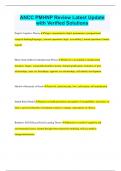
-
ANCC PMHNP Review Latest Update with Verified Solutions
- Exam (elaborations) • 15 pages • 2023
- Available in package deal
-
- $9.99
- + learn more
ANCC PMHNP Review Latest Update with Verified Solutions Piaget's Cognitive Theory Stages: sensorimotor (object permanence), preoperational (magical thinking/language), concrete operations (logic, reversibility), formal operations (formal, logical) Henry Stack Sullivan's Interpersonal Theory behavior is in respond to interpersonal dynamics. Stages: oral gratification/first anxiety, delayed gratification, formation of peer relationships, same sex friendships, opposite sex relationships, self-id...

How much did you already spend on Stuvia? Imagine there are plenty more of you out there paying for study notes, but this time YOU are the seller. Ka-ching! Discover all about earning on Stuvia


